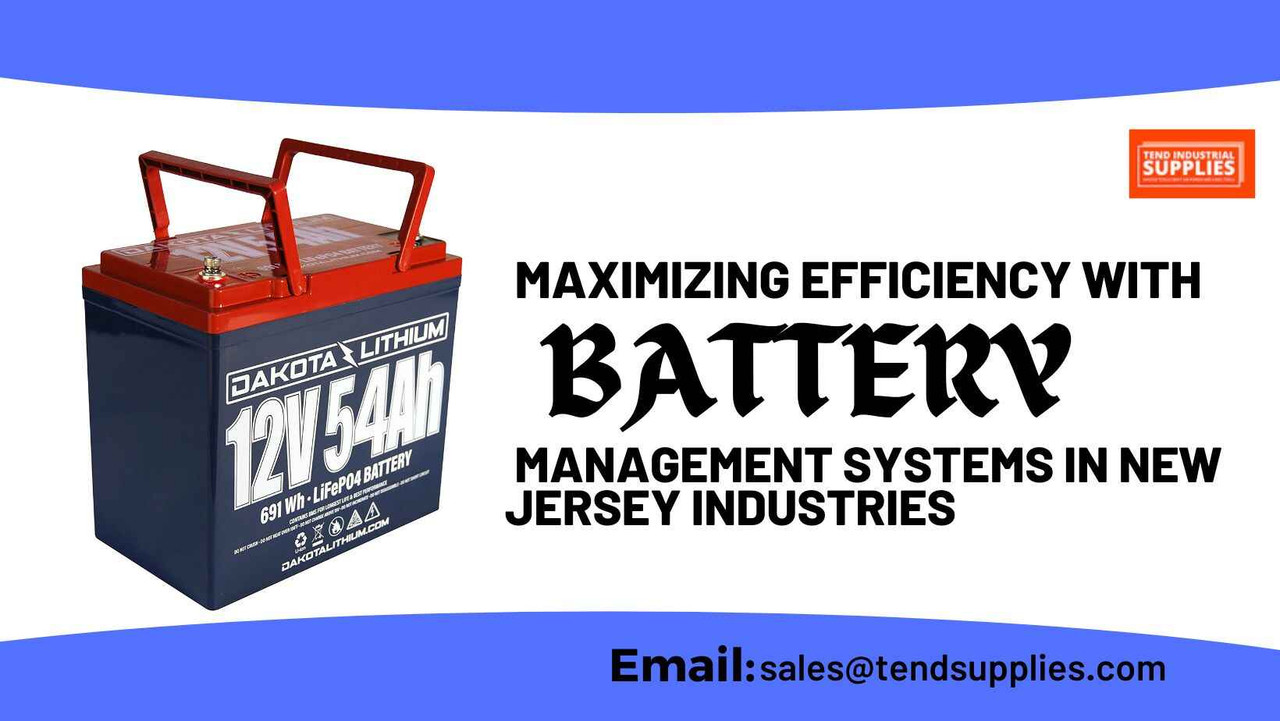Maximizing Efficiency with Battery Management Systems in New Jersey Industries
Introduction
In today’s energy-driven industries, maximizing operational efficiency is more critical than ever. In New Jersey, where businesses face rising energy demands and the need for sustainability, Battery Management Systems (BMS) have emerged as a game-changer. These advanced systems are designed to monitor, manage, and optimize the performance of industrial batteries, ensuring uninterrupted power supply, reducing downtime, and extending battery life. By implementing a reliable BMS, industries can not only enhance energy efficiency but also lower operational costs, making them an essential tool for any forward-thinking enterprise.
This guide explores how Battery Management System can transform New Jersey’s industrial landscape, providing key insights into their features, benefits, and applications.
Understanding Battery Management Systems (BMS)
A Battery Management System is a crucial electronic control system that monitors and manages the performance of rechargeable batteries. Its primary functions include:
- Monitoring: Constantly assessing battery performance metrics such as voltage, temperature, and current.
- Balancing: Ensuring that all battery cells operate at the same level, preventing overcharging or discharging.
- Protection: Automatically shutting down the system in case of over-voltage, over-temperature, or short circuits.
- Reporting: Providing real-time data on battery health, status, and performance to industrial operators.
BMS can be classified into different types, each tailored to specific industrial applications:
- Modular BMS: Ideal for large-scale applications like energy storage systems.
- Centralized BMS: Used in industries requiring a single control unit for multiple batteries.
- Distributed BMS: Suited for applications with numerous battery cells requiring independent management.
By integrating these components, BMS ensures that batteries run efficiently, last longer, and are safer to use, particularly in high-demand industrial environments.
The Importance of Battery Management Systems in Industrial Operations
Battery Management Systems play a pivotal role in enhancing energy efficiency and operational reliability for industries in New Jersey. Key benefits include:
- Energy Efficiency and Power Optimization: BMS optimizes energy usage by ensuring batteries discharge evenly and efficiently, reducing energy wastage.
- Preventing Downtime: Continuous monitoring helps identify potential battery issues before they result in operational interruptions, saving industries valuable time and resources.
- Extending Battery Lifespan: By preventing overcharging and ensuring balanced usage, BMS extends the life of industrial batteries, reducing replacement costs.
- Safety: For industries handling hazardous operations, BMS provides a critical safety net by preventing overheating, overcharging, and other battery-related hazards.
Industries in New Jersey Benefiting from Battery Management Systems
Different sectors in New Jersey benefit significantly from adopting BMS technology:
- Manufacturing: Factories with heavy machinery require uninterrupted power. BMS systems ensure energy is used efficiently, helping manufacturing plants reduce power consumption and minimize costly interruptions.
- Logistics and Warehousing: In large warehouses with battery-powered forklifts, BMS can help manage the battery usage of these machines, ensuring longer operational periods and reducing the frequency of recharging.
- Renewable Energy: Solar and wind power facilities use battery storage systems to store excess energy. BMS ensures that these systems operate optimally, managing energy storage and discharge efficiently.
- Healthcare: Hospitals and medical facilities rely on continuous power for critical equipment. BMS helps manage backup power systems to ensure that emergency power is always available when needed.
Each of these industries faces unique challenges that can be mitigated by implementing a reliable Battery Management System.
How BMS Maximizes Efficiency in New Jersey Industries
BMS has become the cornerstone of energy efficiency in industries. Here's how it achieves maximum efficiency:
- Optimizing Energy Consumption: By regulating charge cycles and managing peak demand, BMS ensures that only the necessary amount of energy is used. This is particularly important in energy-intensive sectors like manufacturing, where power surges are common.
- Reducing Operational Costs: Industries can cut costs by using batteries more efficiently, thereby avoiding the frequent need for replacements. The predictive maintenance capabilities of BMS further reduce costs by identifying battery issues early.
- Data-Driven Maintenance: Advanced BMS systems gather data on battery usage, which can be analyzed to predict maintenance needs, reducing the risk of unexpected downtimes and improving operational planning.
- Increasing System Reliability: A properly managed battery system ensures continuous power supply, especially during high-demand periods. This is crucial for industries like healthcare, where any power interruption could be catastrophic.
Frequently Asked Question
1. What is the primary function of a Battery Management System (BMS)?
A BMS monitors, balances, protects, and reports on battery performance to optimize energy efficiency, prolong battery life, and ensure safety in industrial applications.
2. Can BMS be integrated into existing industrial setups?
Yes, BMS can be seamlessly integrated into existing systems to enhance battery management. It is compatible with various battery types and industrial machinery.
3. What type of industries benefit most from BMS?
Industries such as manufacturing, logistics, renewable energy, and healthcare benefit significantly from BMS due to their reliance on battery-powered systems and uninterrupted power.
4. How does BMS improve energy efficiency?
BMS optimizes energy consumption by regulating charge cycles, preventing energy wastage, and ensuring that all battery cells are used efficiently. This results in reduced energy costs and longer battery life.
5. What are the long-term cost benefits of using BMS in industrial operations?
BMS reduces operational costs by extending the life of batteries, preventing unexpected downtime, and lowering energy consumption. It also helps in predictive maintenance, which minimizes costly repairs.
Key Features to Look for in a Battery Management System (BMS)
When selecting a BMS for industrial use, it’s essential to look for key features that will maximize efficiency and safety. These include:
- Scalability: Ensure that the BMS can handle the size and scope of your operations. A scalable BMS allows for expansion as your energy needs grow, especially in manufacturing and large-scale facilities.
- Real-Time Monitoring: Real-time data collection and monitoring capabilities are essential for maintaining optimal battery health. This feature helps operators detect problems early and take preventative measures before any significant disruption occurs.
- Data Logging: Having a system that logs data on battery usage, performance, and health is crucial for optimizing operations. This data allows for better decision-making when it comes to maintenance schedules, replacements, and upgrades.
- Modular Design: A modular BMS offers flexibility and ease of installation. This design allows the system to be tailored to specific industrial needs, whether you are managing a single battery or an extensive battery network.
- Automated Alerts and Shutdowns: Safety is paramount in any industrial environment, and automated alert systems ensure that in the event of any irregularities (such as overcharging or overheating), immediate action can be taken to prevent accidents or equipment damage.
Choosing the Right BMS for Your Industry
Selecting the right Battery Management System involves assessing your specific industrial needs. Here are a few considerations:
- Battery Type: The BMS you choose must be compatible with the type of batteries your industry uses, such as lithium-ion, lead-acid, or nickel-cadmium. Different BMS models are designed for various battery chemistries, so selecting the appropriate one is crucial for efficient management.
- Industry-Specific Applications: Certain industries, such as healthcare or renewable energy, may have unique requirements that necessitate specific BMS functionalities. For example, healthcare facilities may require systems with more robust backup power management, while renewable energy setups may benefit from features that optimize energy storage.
- Energy Capacity and Scalability: Depending on your operation’s size, the energy capacity of your batteries will vary. Make sure that the BMS can handle the peak energy loads and is scalable for future expansions.
- Cost Efficiency: Consider the long-term savings that a BMS can offer in terms of energy efficiency and extended battery lifespan. While the upfront investment may seem high, the reduction in maintenance and replacement costs can make it a worthwhile expenditure.
Implementing BMS in Industrial Environments: Best Practices
Once you've chosen the right BMS, the next step is implementation. Here are best practices to follow:
- Conduct a Battery Audit: Before installing a BMS, perform a thorough audit of your current battery systems to understand their performance and weaknesses. This will help you identify which areas of your operation will benefit the most from a BMS.
- Train Staff: Ensure that your staff is trained to understand and use the BMS effectively. Since the system monitors critical energy data, operators should be equipped to interpret and respond to alerts and reports.
- Regular Maintenance and Updates: BMS requires routine maintenance to function correctly. Schedule regular checks to ensure the system is running optimally and update the software regularly to benefit from the latest technological advancements.
- Leverage Data for Optimization: Utilize the data generated by the BMS to optimize operations further. For example, you can adjust energy usage patterns, fine-tune charge cycles, or invest in additional storage capacity based on usage trends.
Future Trends in Battery Management Systems
As technology evolves, so will Battery Management Systems. Here are some trends to keep an eye on:
- AI Integration: In the near future, BMS systems may leverage artificial intelligence to predict failures before they happen and automatically adjust battery usage for optimal efficiency.
- Cloud-Based BMS: With cloud integration, BMS systems will offer remote monitoring capabilities, allowing operators to manage battery performance from anywhere in the world.
- Smart Grid Connectivity: The growing adoption of smart grids will enable BMS to communicate with the larger energy infrastructure, providing better control and optimization of industrial energy consumption.
Frequently Asked Question
1. How does a Battery Management System improve battery efficiency?
A BMS improves battery efficiency by monitoring key performance metrics, optimizing charge cycles, preventing overcharging or discharging, and balancing the use of each cell in a battery system.
2. Can a BMS be used with different types of batteries?
Yes, but it’s essential to choose a BMS that is compatible with the specific battery chemistry your industry uses, such as lithium-ion, lead-acid, or nickel-cadmium.
3. What industries benefit the most from BMS implementation?
Industries such as manufacturing, healthcare, logistics, renewable energy, and data centers can significantly benefit from the energy efficiency, cost savings, and safety features offered by BMS.
4. How often should a BMS be maintained?
Regular maintenance is critical for optimal performance. It’s recommended to perform checks at least once every quarter and update the software to ensure the system is up to date with the latest features.
5. Can BMS help reduce operational costs?
Yes, BMS reduces operational costs by extending battery lifespan, preventing downtime due to unexpected battery failures, and optimizing energy consumption, thereby lowering overall power expenses.
Related Article
Advanced Battery Technology for Industrial Applications in Maryland
Conclusion
For industries in New Jersey looking to optimize energy usage and increase operational efficiency through advanced Battery Management Systems, Tend Industrial Supplies offers cutting-edge BMS solutions. Explore our comprehensive range of battery management products designed to meet your industry’s unique needs. Contact us today to find out how we can help your business achieve greater efficiency and sustainability.









